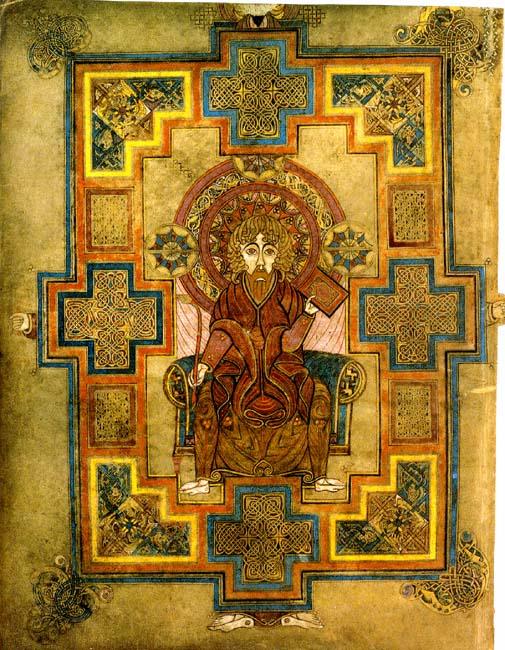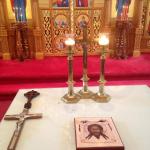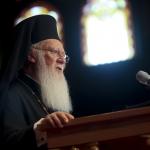
I have long reflected on why, mysteriously, the Holy Apostle and Evangelist John the Theologian has been special to me. I ask myself this again on this celebration of his repose. Reflecting, I wonder whether my time spent as a doctoral student, freshly disillusioned with the prospect of ordained ministry in the Anglican Communion and questioning the logics of the realignment, might have contributed to this devotion, especially as I worshipped regularly in a parish that was deeply connected to the heart of the crisis in the Diocese of New Westminster, the one named for St John. This thought occurred to me because I have recently shared on my Facebook the publication of a peer-reviewed article I wrote for Ching Feng: A Journal of Christianity and Chinese Religion and Culture titled ‘A Tale of Three Bishops.’ In it, I show through some research that the fracture of the Anglican Communion in Vancouver was not so much over sexuality issues, but over a debate about what it meant for Vancouver to be becoming a global city and a hub for international migration, especially for Chinese people. In writing it, I sought to be fair on all sides of the debate, partly because I have friends on all sides, have been invested in all sides, and am no longer engaged in any of the sides because I am now Eastern Catholic. Part of that former investment, however, has a lot to do with patronage of the Holy Theologian John, in the parish where I was married by a rector whose surname was, incidentally, Love. I wondered whether having worshipped among a people named for St John, if he then continues to pray for me.
In seeking out answers after my Morning Prayers today, I stumbled on some icons that reminded me that my reading of Holy John the Theologian extends back before I even entertained the thought of becoming Anglican, much less Eastern Catholic. As a young evangelical in the early 2000s, I, like many of my peers, was exposed to the Left Behind series, a popularization of prophecy readings that took the dispensationalist interpretations of Hal Lindsey and Grant Jeffrey to the realm of popular fiction. I had my doubts about those readings even then, though I, like many evangelicals, was steeped in that world. I even took correspondence Bible college courses that emphasized the rapture and readings of John’s Apocalypse in the terms of modern geopolitics and spoke with my secular professors about them, particularly on the question of Russia in relation to the entities Gog and Magog – and was very entertained by their bewilderment. When I was a child, I found the images of Revelation vivid and imaginative, and just as I play-acted the scenes from the Hebrew Scripture books of Joshua and Judges, I sought to enact those apocalyptic scenes too, with little success, as the trumpet judgments were difficult to fully realize in the living room, even though I played the trumpet myself. In that time, I used to go to the library computers to search for theology as a key word to bolster those live-action role plays. I wonder whether the Theologian had me even then.
Or was it, I wondered, something to do with my conversion to Catholicism, especially in the scene we visit in John’s Gospel today? From the cross, our Lord tells his Mother that the beloved disciple is, behold, her son, and as that disciple – the one who lay in the Lord’s bosom just earlier at the supper in the upper room – beholds his mother, he takes her into his home. I remember reading Hans Urs von Balthasar’s meditations on this scene and discovering that it makes sense for us to claim the Most Holy Theotokos as our mother, even to the point that – as my spiritual father never ceases to tease me – I have taken to calling her Mom. This is the scene that does it for me – the intimacy of John the Beloved Disciple with his Mother, the maternal care we share with him in relation to the God-bearer, because the love the Lord has for him is one that he invites us into as participants in faith through the writings that bear witness to Incarnation of God that he saw, felt, and touched. Through him, I recognized the Immovable Wall as my Mother. In so doing, I identify deeply with his experience.
I thought of all this, and a scene replayed in my mind, as if I were actually doing the Ignatian examen properly for once, from last night while I was having supper with some dear friends whose ecclesial lives are still circumscribed by the networks of evangelical Protestantism in America. At one point in the conversation, one of them mentioned the word theology. Someone that she knew had told her to make sure in all of her explorations to maintain a ‘good theology.’ I remembered that that was how I used to use the word, even in my piece on grounded theologies, where I described the work of geographers of religion as mapping the ‘performative practices of placemaking informed by understandings of the transcendent.’ In so doing, I gave away that I thought that theology is the logos, the word, about the theos, the divine. Theology in this sense is a subjective understanding of God, a proposition that I offer about that which transcends my understanding, and in this way, orthodoxy is framed as an alignment between my internal musings about God and the propositional statements of faith that set forth the self-revelation of God as evangelical Protestants understand him. Good theology for my evangelical friend is the policing of her inner world with these exterior propositions, making sure that with all her experiences and encounters, she will not depart from the boundaries of the word that an institution prescribes.
But this is not the sense in which the Holy Evangelist and Apostle John is a Theologian. There are only three saints in Orthodoxy who are given the distinct appellation the Theologian, the other two being Gregory of Nazianzus and Symeon the New Theologian, and their writings are anything but canonized statements of faith. In fact, they are a royal mess, dripping with passion, gushing with excess, exuding a love that can only be described as erotic. It was the sense in which my evangelical friend also felt her approach to God – as intimate, excessive, and flowing into actions for social justice. Theology in this sense is not the codification of propositions about the divine. It is a direct encounter with the One Who Is, given concrete form by the beloved disciple who lays his head on the bosom of the Lord, just as the Lord is the Logos who comes from the bosom of the Father and has exegeted him. Exegesis in this sense is the word for intimate encounter. It is the scholarship that is premised first on being in love with Being revealed as Person, if not three.
The repose of John the Theologian reminds me therefore that I am Orthodox not because I adhere to a set of theological statements, but because theology is itself the impossible task of describing an encounter of love that defies description because it is with the God whom the Theologian describes as Love. I am reminded, then, of how much of a conversion it was for me when I was received into the Church of Kyiv. Before, theology – and with it, the conception of orthodoxy and the tasks of exegesis and scholarship – was about codified propositions, subjective understandings of the transcendent to which I might take a detached view in the interest of preserving a veneer of objectivity in my academic work. But now, theology, my commitment to orthodoxy, and my exegetical and scholarly practices in an academy designated as secular is about falling in love. Driven by eros, I can only hope that what this means is that my writing will not only serve to demonstrate that I am a productive person or to create fields of Babel. Instead, it is simply how I love, because I was first loved, and in the theology of Holy John the Theologian is that love that I share with him despite his repose given voice in words so that theology is nothing more and nothing less than the exegesis of the One in whose bosom I have come to rest.












